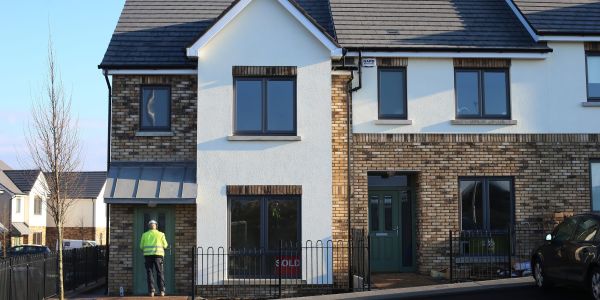Banks should be temporarily banned from repossessing homes until proposals to solve the mortgage arrears crisis are finalised, a special parliamentary body has told the Government.
The Committee on Housing and Homelessness issued 23 recommendations over the unprecedented shortage of homes including a call for the state to own another 50,000 homes over the next five years.
It said 10,000 homes should be added each year by buying properties, refurbishing those in poor condition and new builds.
With four homes a day being repossessed by lenders and vulture funds, the committee urged the Government to fast-track its plans to tackle the mortgage arrears crisis with about 35,000 households two years behind with repayments.
It said the new rules forcing banks to offer debt-hit home-owners two solutions before trying to take the keys off them should be brought in before the Dail rises for the summer.
The committee said rent certainty is needed and suggested linking annual reviews of leases to the inflation rate.
It suggested giving tenants more rights against eviction including extending security of tenure from four years and giving residents legal rights to stay in a home after it is sold.
And it called for welfare payments to at-risk tenants, such as rent supplement and housing assistance payments, to be increased to meet the market reality.
It also said a new body should be set up – the Housing Procurement Agency – to fast-track social housing building projects using staff from a range of Government departments and state agencies including finance and local government.
And it called on finance chiefs to get Europe to relax rules on budgets to drive money into solving the housing shortage crisis.
The committee said money borrowed through the state’s bad-bank Nama, the Housing Finance Agency and Credit Unions could steer the much-needed billions of euro into the system while avoiding strict Brussels’ spending limits.
Committee chairman John Curran said the recommendations were about removing obstacles to house building.
“Homelessness remains a very real issue in Ireland and as well as those people sleeping rough, it is also important to acknowledge the swathes of people who are not immediately identifiable as homeless – those who are waiting on housing lists; living in temporary, unsuitable accommodation and those desperately trying to find affordable rental accommodation,” he said.
One of those on the committee, Socialist Party TD Ruth Coppinger, issued her own recommendations, warning that her colleagues had not gone far enough.
“It will not eliminate the misery of the longest housing lists in our state’s history,” she said.
“It doesn’t locate the roots of the problem in the private market itself or even mention the fact that private developers are currently hoarding land and housing, waiting for prices to rise further on the backs of suffering families.”
Ms Coppinger said the social housing targets would take 15 years to clear waiting lists which hold up to 140,000 households.
The Peter McVerry Trust backed the recommendations to get more social houses, link rents to inflation, increase welfare and make tenancies more secure but questioned why a referendum on the right to a home was not included.
Pat Doyle, chief executive, said: ” The recommendation to put a moratorium on home repossessions is a hugely significant proposal because it will prevent more families from becoming homeless.
“However, it is important to note that unless the Government fully engages with the banks on this issue, which is something that has been lacking up until this point in time, a solution to this dire problem that many families face across the state will not be reached.”
The Irish Society for the Prevention of Cruelty to Children (ISPCC) said it was deeply disappointed that minimum standards for emergency accommodation were not in the report.
At the end of April 2, 121 children were homeless and 1,359 children from 670 families were being housed in hotel and B&B accommodation in Dublin.
The voice of the child is missing from the report, the charity said.
Chief executive Grainia Long said staff in emergency accommodation should be Garda vetted.
“We believe it is unacceptable for the state to procure these accommodation services and place children in hotels or B&B accommodation without having first put in place minimum physical and management standards to ensure the safety and protection of children,” she said.
Simon Coveney, Minister for Housing, Planning and Local Government, is due to publish the Government’s housing plan in the coming weeks.
He has said 35,000 houses have to be built a year to clear waiting lists and meet demand – only 3,000 social houses are being supplied this year.
Eoin O Broin, Sinn Fein committee member, said the 50,000 target for social housing would mean the Government has to treble its response.
“The committee’s recommendations are ambitious, but they are also necessary to make a real dent in the housing crisis,” he said.
“Minister Coveney has promised to make radical decisions if necessary to tackle this crisis. He should start by adopting the recommendations of this committee.”
